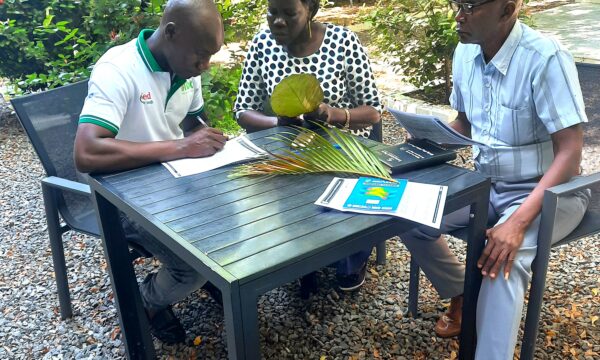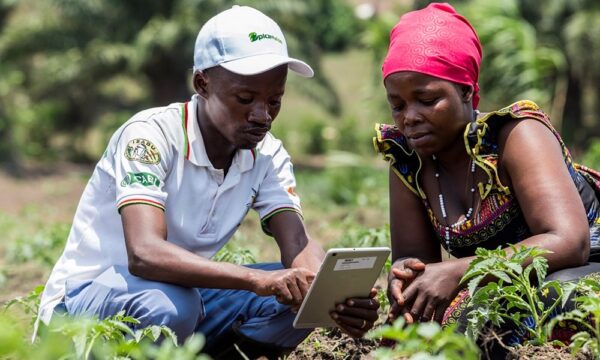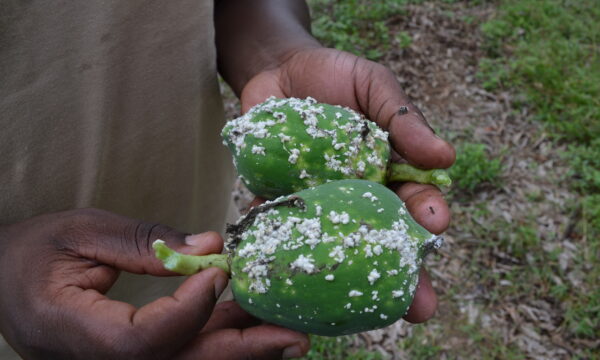
In a recently published paper in Scientific African, CABI’s Willis Ochilo led on a study which captured a better understanding of tomato producers in Kenya, describing in detail the production practices in order to identify challenges and opportunities for increasing tomato productivity for the country’s smallholder communities.
Tomato is a good source of vitamins A and C, and lycopene making it an important crop in terms of food and nutritional security for families in Kenya, and is in fact eaten in nearly all households across the country.
Although tomato is “among the promising commodities in horticultural production in Kenya” and over the years production has intensified, farmers are not seeing increased yields. According to the research this is due to “a myriad of constraints” such as climate change and soil health, as well as plant pests (e.g. Tuta absoluta) and diseases (fungal, bacterial, viral). However, other factors such as farmers’ overreliance on pesticides and lack of access to improved seed also play a part.
The researchers used data from Plantwise plant clinics from 121 locations in 14 counties across Kenya over a four-year period. From each location, farmers visiting their local plant clinic were interviewed. Over the duration of the study, almost forty thousand farmers visited the clinics, and of these 4,907 were tomato farmers.
From this sample, the study found that farmers were assigning less and less land area to tomato cultivation which the authors suggest could be due to farmers adopting high-yielding varieties and other modern technologies for increased yields that use less land. However, conversely it could also be down to farmers perpetually achieving disappointing yields and/or profits.
In addition, the data showed that tomato farming is dominated by male farmers. Although women in Kenya play a crucial role in agriculture particularly in terms of household food and nutritional security, overall, they largely under-resourced. To include more women in tomato production, the study calls for a change in policy to “increase women’s physical and human capital” by safeguarding their rights to land, better access to agricultural extension, better education for girls in rural communities, and supporting the training of more women in agricultural sciences.
Participation by young farmers was also very low and the authors posit that this could be down to issues of land. Land remains a huge challenge for today’s youth who most often do not have land of their own to farm, meaning they cannot get started with income to access good quality inputs for better yields. This only exacerbates the perception among young people that agriculture is not rewarding and pushes most of this generation into city jobs instead.
All of these aspects intersect and underscore the need to: increase the participation of women and youth in tomato farming; explore initiatives to help farmers access improved seed; and encourage farmers to consider alternatives to an overreliance in the use of synthetic pesticides.
Only by capturing this complex picture of tomato production can we begin to find opportunities to improve the slow growth of this important crop in Kenya.
Read the paper in full (open access):
Ochilo, W., Nyamasyo, G., Kilalo, D., Otieno, W., Otipa, M., Chege, F., Karanja, T. and Lingeera, E. (2019). Characteristics and production constraints of smallholder tomato production in Kenya.
Helpful resources
- Plantwise Knowledge Bank: Tomato crop in Kenya
- CABI Evidence Note: Tomato leafminer (Tuta absoluta) impacts and coping strategies for Africa
- CABI Invasive Species Compendium: Tuta Absoluta information portal
- CABI Bookshop: Tomatoes: Crop Production Science in Horticulture
3 Comments
Leave a Reply
Related News & Blogs
Parasitic wasps play pivotal role in Kenya’s papaya mealybug control
Papaya mealybug (Paracoccus marginatus) is a devastating papaya pest. It impacts many countries in East and West Africa. Infestations can result in significant economic losses, posing a threat to the livelihoods of smallholder farmers. On average, the…
15 April 2024








[…] […]
[…] […]
[…] […]